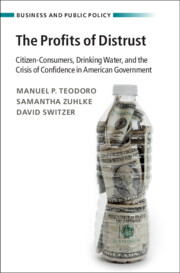Refine search
Actions for selected content:
5 results
6 - Geographies of Alienation
-
- Book:
- The Profits of Distrust
- Published online:
- 18 August 2022
- Print publication:
- 25 August 2022, pp 146-174
-
- Chapter
- Export citation
1 - Basic Services and Trust in Government
-
- Book:
- The Profits of Distrust
- Published online:
- 18 August 2022
- Print publication:
- 25 August 2022, pp 1-34
-
- Chapter
- Export citation
3 - (Dis)trust at the Tap
-
- Book:
- The Profits of Distrust
- Published online:
- 18 August 2022
- Print publication:
- 25 August 2022, pp 70-99
-
- Chapter
- Export citation
4 - Hyperopia and Performative Trust
-
- Book:
- The Profits of Distrust
- Published online:
- 18 August 2022
- Print publication:
- 25 August 2022, pp 100-124
-
- Chapter
- Export citation

The Profits of Distrust
- Citizen-Consumers, Drinking Water, and the Crisis of Confidence in American Government
-
- Published online:
- 18 August 2022
- Print publication:
- 25 August 2022
